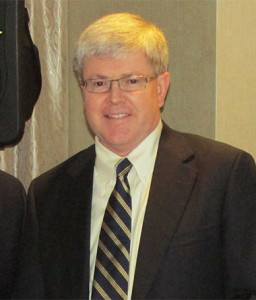 Eye on Education: What was the purpose of the National Eye Care Workforce Study? What were you hoping to find? Why now?
Eye on Education: What was the purpose of the National Eye Care Workforce Study? What were you hoping to find? Why now?
Dr. Alexander: The purpose of the study was to give the optometric profession an assessment, at this point in time, as to the current and projected supply of optometrists and ophthalmologists and demand for eye care services.
We were hoping that the study would result in meaningful data to assist in healthcare planning, educational planning and scope of practice considerations.
EonE: What do the findings say about the future of academic optometry? For future Doctor of Optometry students?
Dr. Alexander: With a dynamic profession and ever-expanding scope of optometric practice, the future of optometric education is constantly changing, so the results of the study do little to change that fact. The study does point to increasing opportunities in the area of medical eye care which, of course, the profession has been preparing for, for at least a generation. The scope of practice changes that have occurred over the past 40 years have positioned optometry well to fill the increasing demand for medical eye services while maintaining our traditional role in vision care.
The future for Doctor of Optometry students, as well as the practicing optometrist, is bright if they embrace the future and practice to the fullest scope allowed by law.
EonE: What is your overall sense of the study? How it was conducted? The questions asked? The results?
Dr. Alexander: As one who played an integral role in the development and execution of the study, I am pleased with the results. This was a very difficult undertaking. The project team tried to set appropriate goals for the study, craft questions that would lead to meaningful results and, along the way, be careful not to allow preconceived notions to taint the process. In addition, the project team selected the professional survey firm that conducted the study.
I think we were successful in our goals. While it is easy to find fault with studies, one must remember that no study is perfect and that every study can be improved after the fact. For example, the study raises many questions such as regional workforce differences and gender differences in projected capacity that are worthy of study. In reviewing a study such as this, one must also remember that these things have to be accomplished within a certain period of time to be useful, and, of course, there is a budget to be maintained.
EonE: Let’s discuss the survey result that most are talking about: Respondents say they could see an average of 19.8 additional patients per week without adding hours to their practice schedule. What is your response to that? How will academic optometrists/faculty in optometry schools address this issue with their students, and will curricula change or adapt because of this?
Dr. Alexander: It is interesting that you comment that “most are talking about” the additional capacity question. Frankly, from my perspective, this is the weakest part of the study and the question was added late in the process. We knew, anecdotally, that many optometrists believe they can see more patients. As the study developed, we tried to figure out a way to get a handle on that issue and decided “let’s just ask the question,” and the result was 19.8. I think it is important that we not read too much into this number as additional study is required. For example, are there differences in age, gender or how practitioners use technology?
While this is not a strong part of the study, the project team did feel it was important to include the response to this question and factor it into projections. I do not feel this finding impacts optometric education significantly. Whether this is a meaningful finding in predicting workforce needs is yet to be determined.
EonE: In light of the entire survey, what would you say to a potential optometry student? Parents? Current student? Recent graduate?
Dr. Alexander: My response to all of these groups, as well as existing practitioners, is the same it has always been. I remain bullish on optometry. It is a wonderful profession, full of opportunity for those who embrace the future. If you expect optometry (or any other healthcare profession) to be the same as it was when you graduated, you will be disappointed. But for those who accept that change is part of the deal and adapt accordingly, there are opportunities for success.
EonE: Will another study be conducted in the future?
Dr. Alexander: Assuming that funding will be available, I’m sure a future study will be conducted. The beauty of this study is that we have a model that allows us to change assumptions as we gather more information. For example, this study made certain assumptions about the Affordable Care Act that may, or may not, play out. As we get solid data, we can update the study and see what results follow.

